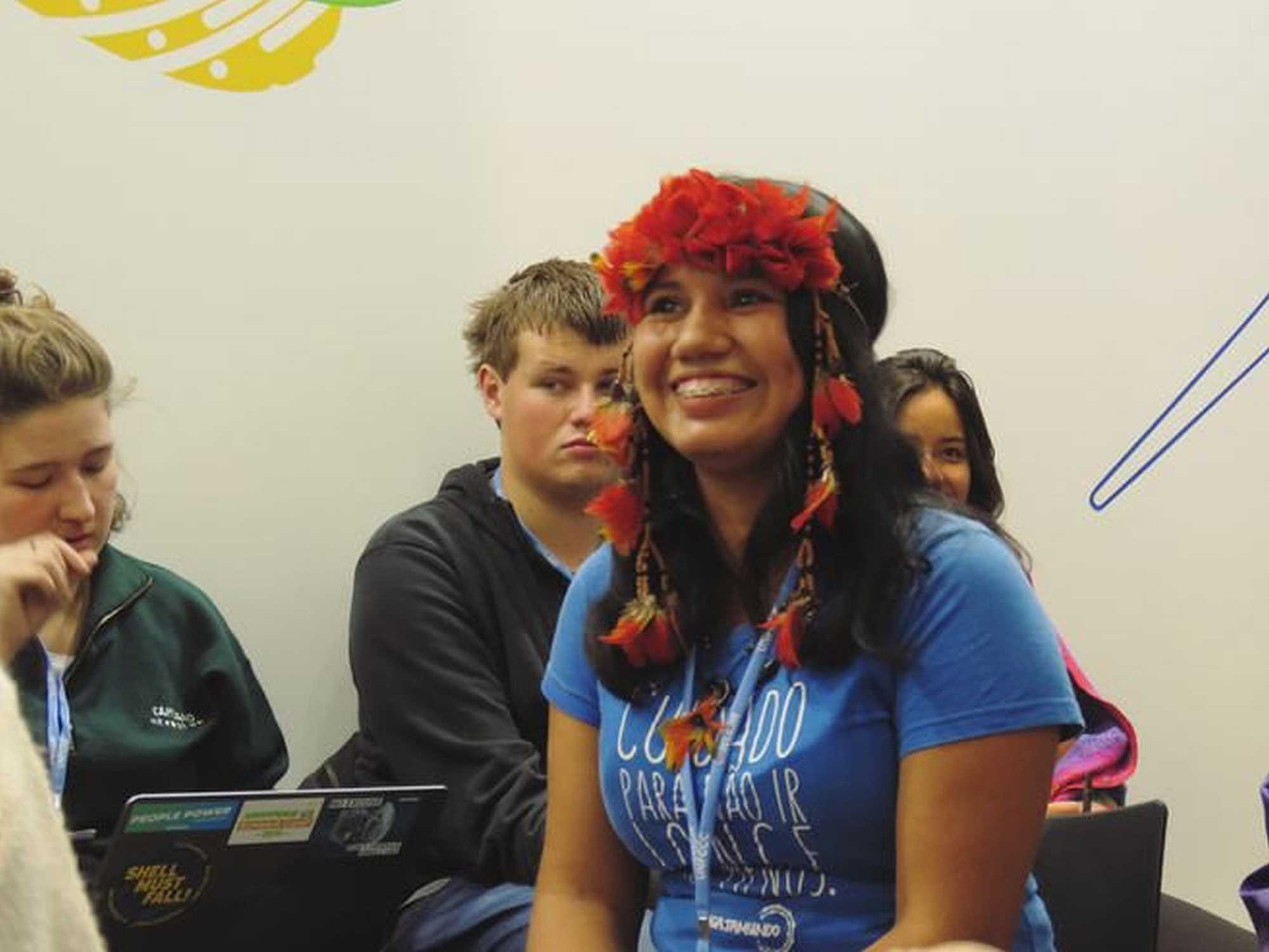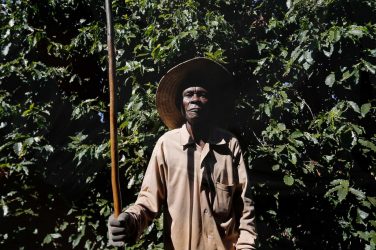We see how our forests are turning into large mud pools. We see how the sources of our rivers are silting up and how their courses are diverting. We see how the tree shadows begin to disappear, how the harvested fruits are diminishing, and how the crystalline water of the Tapajós River, of the igarapés – the streams – and the springs becomes murkier by the day. Finally, we see how the smoke from many fires darkens our sunset.
All of this is happening in the Munduruku Indigenous Territory, where I am from. I was born and raised here, along the upper course of the Tapajós River, in the Jacareacanga municipality in Brazil’s northern state of Pará. COVID-19 has hit our communities hard, and without any government emergency plan for the Indigenous villages, too many of our great leaders have died. They were the living libraries of our culture, and now they are gone. We must act.
Yet despite the difficulties faced by coronavirus in recent months, illegal mining has not stopped. On the contrary, we have seen an alarming increase in deforestation and pollution.
An Enormous Concern
Indigenous people have enormous concerns. We depend directly on the river for the water we drink and bathe in, and for the fish we eat. The mercury used in illegal gold mining is being dumped directly into our rivers, contaminating the water, the fish, the people.
A recent study points to a high level of mercury in the blood of the Munduruku people, which can cause anything from minor brain damage to death. Animals, an important food source, are moving away from us.
Increased violence is also a result of the mining, which attracts workers, mostly men from various regions of Brazil. Their arrival has led to an increase in the circulation of drugs, illegal possession of weapons, and prostitution in the Munduruku Indigenous Territory.
Official data from 2018 indicates that mining discharges more than seven million tons of sediment per year into the Tapajós River. The sediment is discharged in the upper Tapajós basin, reaching the lower Tapajós, almost 1,000 kilometers away.
Indigenous leaders who fight the mining and defend the forest face daily attacks and threats, with some even forced to leave their territories. Non-indigenous garimpeiros (independent small-scale miners) take advantage of a lack of federal government policies that seek to include Indigenous people in the activity on their land.
Indigenous people, therefore, end up with no choice but to accept illegal mining and in exchange for their land, their most precious asset, they receive just a tiny percentage of the gold that the miners take. Mining is the cause of disease and destruction in the Indigenous territories, which will lead to the end of Amazonian biodiversity.
Operation Green Brazil 2
The Munduruku people have continued to protest and in May, Brazil’s Ministry of Defense started ‘Operation Green Brazil 2’ in the Indigenous territory. According to the federal government website, the goal was to “combat and repress environmental crimes in the Brazilian Amazon basin, and intensify the application of fines for environmental crimes in the region”.
Controversial environment minister Ricardo Salles, who was in 2018 found guilty of altering environmental protection maps to benefit miners, was a prominent part of Operation Green Brazil 2.
But there were enormous contradictions in the whole exercise. Rather than fighting environmental crimes, the government flew Indigenous people involved in mining to the capital, Brasília, on the Brazilian Air Force plane, to meet with representatives from the Ministry of the Environment.
According to a report from Jornal Nacional, a Brazilian news program, on August 12, inspectors from the Brazilian Institute of Environment and Renewable Natural Resources (IBAMA), a government agency, set fire to mining equipment and camps. The miners reacted violently, even threatening to shoot down a helicopter.
“Shoot up, my friend. Throw one of those helicopters to the ground, boy. (…) You do it a thousand times, and they’ll think twice before they touch a gold miner,” we recently heard them say in a video recording. The environment minister talked with the group that called for an end to IBAMA operation and even defended mining on Indigenous lands.
After this incident, Munduruku leaders sent a letter to the federal public prosecutor’s office stating that they were absolutely against illegal mining. “The group that went to Brasília was actually seven residents who defend the interests of the garimpeiros,” continued the letter. “They do not represent the people.”
During the 19th ordinary general assembly of the Munduruku people, which ran from September 21-23, the leaders of the Middle and Upper Tapajós gathered in Karapanatuba village to reaffirm their determination to fight illegal mining. Meanwhile, the Coordination of Indigenous Organizations of the Brazilian Amazon (CIOBA) declared that it supports the Munduruku people and is opposed to the promotion of mining in Indigenous lands.
Soon after the Munduruku general assembly and CIOBA’s statement, however, the pro-mining group that went to Brasília blocked the BR-230 Transamazonian Highway, to demand the end of government inspections on indigenous lands.
An International Commitment to the Amazon?
The Munduruku know that multinational companies and governments often ignore Indigenous rights and the need for licenses for various activities, and thereby contribute to the current climate emergency in the Tapajós and in so many other parts of the world.
Consider why the Amazon is so important for the planet’s ecosystem. The rainforest is unique, serving as a biotic pump. This means the forest brings moisture from the ocean to land – basically making it rain where it otherwise wouldn’t.
When plants breathe, they absorb carbon from the atmosphere and store a good part of it in the soil. It is estimated that the carbon stock, as this accumulation is called, varies between 70 and 130 billion tons in the Amazon, a third of which is in Indigenous lands.
The Amazon is the reason that rain falls in Brazil and other countries in the region. Winds from the Atlantic push moisture towards the Andes, forming another ‘Amazon River’, one that flows high in the clouds from north to south of the continent. These so-called ‘flying rivers’ and the process of transpiration, in which plants release water from their leaves during photosynthesis are another reason why the Amazon is so important to the world.
In total, the Amazon causes 20 billion tons of water to evaporate every day, which contributes to the formation of rain clouds that release the water back onto the rainforest. And it is precisely this that is being lost when the forests are cut down. If deforestation continues at its current rate, the Amazon could cease to be a tropical forest in as little as 15 years and become a savanna, a grassland. It will be at a point of no return.
Brazil is the sixth-largest emitter of greenhouse gases in the world, which is largely due to deforestation and changes in land use. Whenever there is a fire or an area is cleared, the carbon sequestered by the forest is released into the atmosphere. Cattle ranching is a major source of Brazilian emissions because cattle constantly release methane into the air, which is 20 times more polluting than carbon dioxide.
But not all of the forest is cleared for pasture. A substantial part is deforested to cultivate soybeans to feed livestock. This is a loop of devastation. The soy is mostly transgenic and requires the use of pesticides, which in turn contaminate our food, our rivers, and our streams.
We cannot stand still and watch. In the past 20 years, 18% of the Amazon has been deforested. If we reach 40%, the forest will be unable to regenerate.
I Crossed the Atlantic
We, the peoples of the forest, know that we are fundamental to the defense of the Amazon and the balance of the planet’s ecosystem.
That is why, as an activist and member of the youth delegation of the Brazilian environmental organization Engajamundo (Engage World), I participated in COP25, the UN Climate Change Conference, in Madrid, Spain, in December 2019.
Aware that it is important to carry the voice of Indigenous peoples to the world, I crossed the Atlantic. We, especially young Indigenous people, are all responsible for the preservation of 80% of the world’s standing forests.
But what I felt in Madrid was that I was there just to listen, not to talk. I found it difficult to follow the sessions because of the language barrier and the specialized language of the technical discussions, which prevented me from understanding everything.
I felt nervous the few times that I had to speak. I saw no real openness to a true dialogue that would include solutions drawn from our Indigenous roots, from our way of being and living. The frustration was enormous when I realized, during the two weeks I was in Madrid, that the real solutions will not come from governments or from the documents they sign internationally.
Instead, real solutions must be built from the ground up, and the global civil society is strengthened by mobilizing. I was impressed by the Global Climate March, which brought more than 500,000 people onto the streets of Madrid to demand climate justice.
I was moved when I went on stage as part of a flash mob of resistance for the peoples of the Amazon. I felt an adrenaline rush when I left a book that we had edited containing claims Ricardo Salles made in his first year in office, next to a chainsaw stained with the ‘blood’ of the many trees killed.
I was happy to inform people from all over the world about how Brazil is polluting its waters. We offered attendees and UN officials a choice of waters – one mixed with mercury, another with oil, or mud, and one that looked clean but probably contained pesticides. By presenting these various water ‘options’, we opened up space for a debate on the quality of the water that we, the people of the Amazon, have access to today in Brazil.
Our land is the physical space necessary for the survival of our cultures. But the COP25 experience showed me that it is more than that. By defending our territory against miners and fighting other threats to the Amazon rainforest, we are also contributing to the fight of the traditional peoples of the small Pacific islands. In just 30 years, these tiny island nations may sink below the rising seas, overwhelmed by the effects of the planet’s climate imbalance.
More than a year after crossing the Atlantic, and now in the midst of a pandemic, I know that the fight against illegal mining in the Munduruku Indigenous Territory goes beyond protecting our sacred territory and ancestral culture. It is about joining – even leading – the struggles of thousands of people around the world for climate justice.
We need to unite to defend the Amazon, or there will be no future for anyone.
Val Munduruku is an indigenous leader and environmental activist, member of Engajamundo, who was born in the municipality of Jacareacanga, on the Tapajós River, in the Brazilian Amazon.
This article appeared originally in Open Democracy – https://www.opendemocracy.net/











